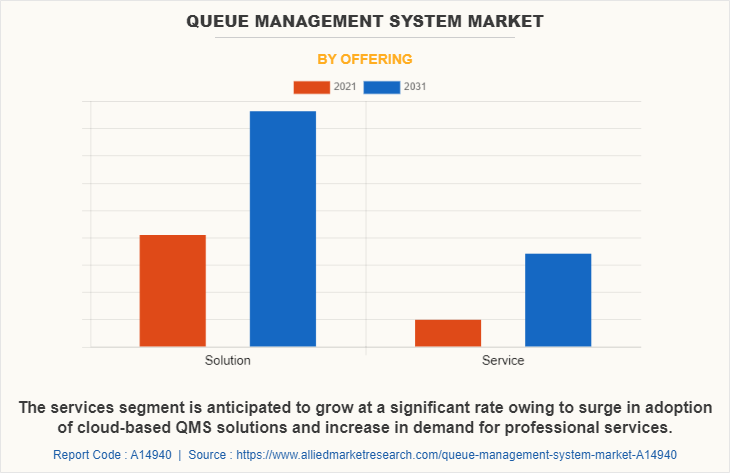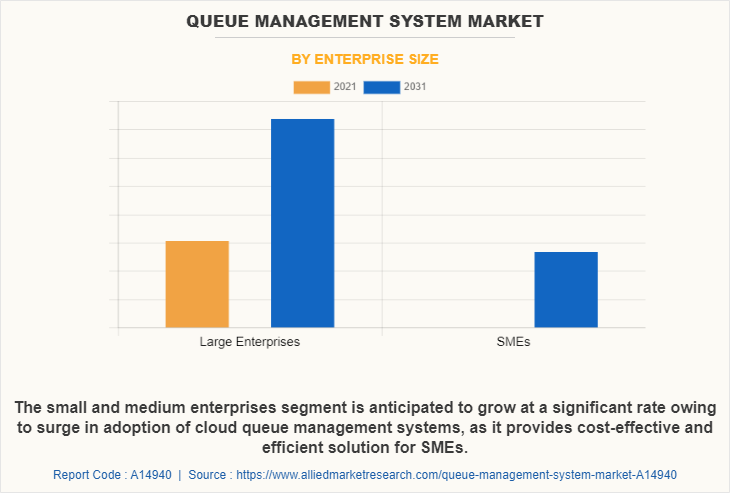Queue Management System Market Research, 2031
The global queue management system market size was valued at $706 million in 2021, and is projected to reach $1.4 billion by 2031, growing at a CAGR of 7.2% from 2022 to 2031.
The queue management system market today has been influenced by several market drivers, restraints, and opportunities. Undoubtedly, need to manage customer traffic and customer movement to boost productivity has accelerated the need for queue management system globally. In addition, increase on emphasis on customer service across major industry verticals have further boosted the queue management system market growth. However, high initial set-up cost of queue management systems restricted the market growth. On the other hand, many SMEs entering the market and providing advance solutions for queue management system is expected to create greater opportunities in the coming years.

Queue management system is an approach used to develop more efficient systems that can reduce customer waiting times or perceived waiting times for service. The aim is to increase both the number of customers that can be served and customer satisfaction with the entire queue experience.
The queue management system industry is segmented on the basis of offering, deployment model, enterprise size, mode, queue type, application, industry vertical, and region. On the basis of offering, the market is segmented into solution and services. On the basis of solutions, the market is segmented into hardware and software. By service, the market is segmented into professional services and managed services. Further, professional services is fragmented into training and education, integration and deployment, and support and maintenance.
On the basis of deployment model, the market is segmented into on-premise and cloud. By mode, the market is fragmented into virtual queuing and non-virtual queuing. On the basis of queue type, the market is segmented into structured queue, unstructured queue, kiosk queue and mobile queue. On the basis of application, the market is segmented into reporting and analytics, real-time monitoring, appointment management, customer service, query handling, in-store management and others.
On the basis of enterprise size, the market is bifurcated into large enterprises and SMEs. By industry vertical, it is segregated into BFSI, healthcare and life science, retail & consumer goods, IT & telecom, travel & hospitality, energy & utilities, government and public sector and others. Region-wise, it is analyzed across North America, Europe, Asia-Pacific, and LAMEA.
Some of the major players in the market are Advantech Co. Ltd, AKIS Technologies, ATT Systems, Aurionpro solution ltd, AwebStar, Business Automation, Core Mobile, Hate2wait, JRNI, Lavi Industries, MaliaTec, QLess, Q-Matic, Qminder, Q-nomy, Qudini and SEDCO. These players have adopted various strategies to increase their market penetration and strengthen their position in the Queue Management System Industry.
By offering, the solution segment dominated growth of the queue management system market share in 2021, and is expected to maintain its dominance in the upcoming years. The need of queue management solutions in various verticals such as BFSI, healthcare and others is driving the growth of the solution segment. However, the services segment is expected to witness highest growth rate during the forecast period. Increase has been witnessed in the adoption of queue management system services among end users over time, as they ensure effective functioning of solutions and platforms throughout the business process. Moreover, increase in adoption of data analytics software and cloud platforms is expected to boost the demand for the services segment.

By organization size, the large enterprises segment dominated the global queue management market share in 2021, and is expected to continue this trend during the forecast period, owing to increase in adoption of queue management system software to integrate this into their existing inventories. Conversely, the small- & medium-sized enterprises segment is expected to grow at the highest CAGR during the forecast period, owing to surge in adoption of cloud-based queue management system solutions, as it provides cost-effective and efficient solution for SMEs.

Top Impacting Factors
Need to manage customer traffic and customer movement to boost productivity
A queue management system is an automated system designed to manage customer service or customer flow. It is primarily used to manage interactions with customers, both face-to-face and through information displayed on the screen. This system helps organizations to manage and control their queue of people. It offers various modules that users can use to process customer requests effectively. A QMS allows businesses to know exactly where inefficiencies are in the queue and continuously address these issues to ensure a consistently positive experience. The benefits of a QMS can span entire business, from increased customer satisfaction to increased business productivity.
Adoption of advanced technologies such as artificial intelligence and analytics
Artificial intelligence and analytics technology play a key role in the expansion of global queue management software market. It combines the analysis, storage, and processing of sensor data with computing using data analytics to enable and support effective customer queue management. With the advent of artificial intelligence and analytics, large companies can offer secure Queue Management Software with a variety of key features, such as online booking, intelligent call answering systems, self-service login, performance tracking, and real-time alerts and notifications.
COVID-19 Impact Analysis
COVID-19 disrupted operations in various industries, including manufacturing and information technology. However, critical industries, such as fast-moving consumer goods (FMCG) and pharmaceuticals were expected to remain open. By early 2021, the situation as expected to be under control, but the growing need to improve customer experience and build personal relationships with potential customers is expected to drive demand for QMS solutions and services. Moreover, during the COVID-19 period, due to WFH policies, the demand for cloud-based solutions and the SaaS-based model increased significantly. This has positively impacted the market growth. Incidentally, during the pandemic, queue management system and automation helped eliminate the dependency on staff availability, thus supporting working and ensuring business resilience.
Key Benefits For Stakeholders
- This report provides a quantitative analysis of the Queue Management System Market Forecast, current trends, estimations, and dynamics of the queue management system market analysis from 2021 to 2031 to identify the prevailing queue management system market opportunities.
- The market research is offered along with information related to key drivers, restraints, and opportunities.
- Porter's five forces analysis highlights the potency of buyers and suppliers to enable stakeholders make profit-oriented business decisions and strengthen their supplier-buyer network.
- In-depth analysis of the queue management system market segmentation assists to determine the prevailing market opportunities.
- Major countries in each region are mapped according to their revenue contribution to the global market.
- Market player positioning facilitates benchmarking and provides a clear understanding of the present position of the market players.
- The report includes the analysis of the regional as well as global queue management system market trends, key players, market segments, application areas, and market growth strategies.
Queue Management System Market Report Highlights
| Aspects | Details |
| By Offering |
|
| By Deployment Model |
|
| By Mode |
|
| By Queue Type |
|
| By Enterprise Size |
|
| By Application |
|
| By Industry Vertical |
|
| By Region |
|
| Key Market Players | Advantech |
Analyst Review
The global queue management system market is projected to witness prominent growth, especially in Asia-Pacific and North America. This growth is attributed to increased investments by organizations and governments for analytics tools and adoption of cloud-based queue management system solutions. In addition, the adoption of IoT (Internet of Things)-based devices globally provides ample growth opportunities for queue management system solutions.
The market is witnessing increased demand from sectors, such as healthcare, hospitality, and manufacturing setups, where these products are used in operations areas, admin blocks, and several other places. Rise in awareness for personal hygiene and increased focus on saving the work environment in various geographies propel the demand for social distancing solutions, including queue management systems.
Moreover, the healthcare and life sciences vertical is expected to adopt queue management system during the forecast period. Ease of handling patient query and enhanced productivity drive the demand for QMS solutions across the healthcare and life sciences vertical across the globe. Prominent market players are exploring new technologies and platforms to meet the increase in customer demands. Product launches, partnerships, and acquisitions are expected to enable them to expand their product portfolios and penetrate different regions. For instance, in September 2020, Qmatic announced a new package offering for healthcare with the release of Qmatic’s latest and improved Health Level Seven (HL7) middleware module. The new healthcare offering from Qmatic supports the three most common patient flows within healthcare, pre-arrival, arrival, and serving, which allows healthcare providers to manage appointments, walk-ins, and emergency patients from arrival to discharge.
The queue management system market today has been influenced by several market drivers, restraints, and opportunities. Undoubtedly, need to manage customer traffic and customer movement to boost productivity has accelerated the need for queue management system globally.
North America largest regional market for Queue Management System
The global queue management system market was valued at $706.0 million in 2021, and is projected to reach $1,404.61 million by 2031, registering a CAGR of 7.2% from 2022 to 2031.
Some of the major players in the market are Advantech Co. Ltd, AKIS Technologies, ATT Systems, Aurionpro solution ltd, AwebStar, Business Automation, Core Mobile, Hate2wait, JRNI, Lavi Industries, MaliaTec, QLess, Q-Matic, Qminder, Q-nomy, Qudini and SEDCO. These players have adopted various strategies to increase their market penetration and strengthen their position in the industry.
Loading Table Of Content...



